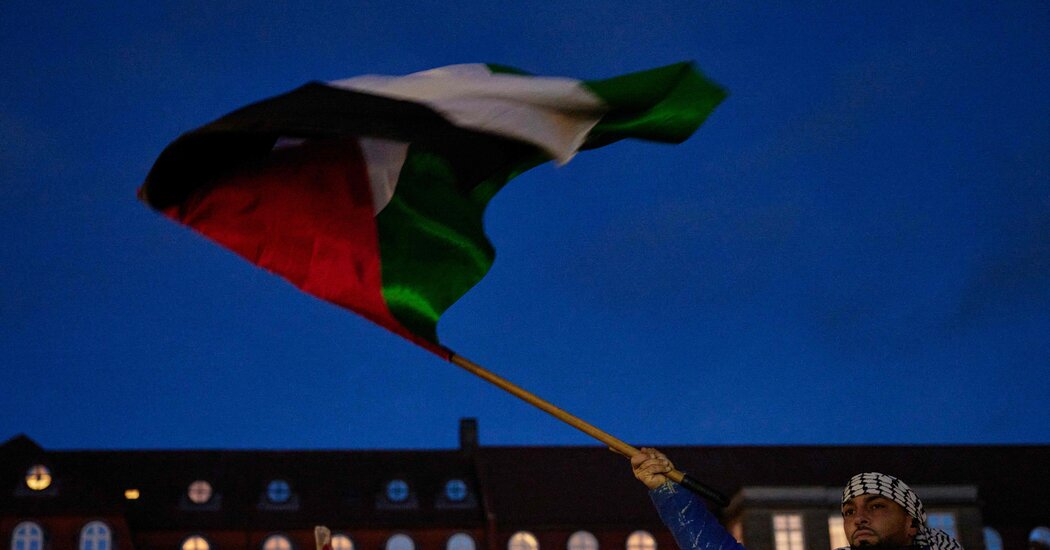
The Israel-Hamas War will affect Western politics
The End of the War? Why the U.S. and Israel need to step up and stop killing the Palestinians, says Jeffrey Matan at the Reflecting Pool
Matan is the group’s spokesman and he explained why they were at the Reflecting Pool.
“We’ve only seen — what is it — 17 members of Congress so far call for a cease-fire. He said that he was grateful for their moral courage. “But the rest of Congress needs to step up and end this bloodshed.”
According to a March analysis by Gallup, Democrats sympathized with Palestinians more than Israelis. About half of Democrats said their sympathies are more with Palestinians, compared to about 4 in 10 who said their sympathies are more with the Israelis. It is decades in the making.
Stephen Walt is professor of international relations at the Kennedy School and he said in the 1970s there was emergence of a real special relationship between the United States and Israel.
The relationship between American leaders of both parties has remained special since then. Proponents have argued it’s strategically important to have a strong democratic ally in the Middle East.
Walt — co-author of the controversial book The Israel Lobby and U.S. Foreign Policy, which was criticized for its views on U.S.-Israel ties — also points to domestic influence from pro-Israel groups as a factor in the alliance. Most notable among those groups is the American Israel Public Affairs Committee, or AIPAC, and Walt says that the influence is asymmetrical.
“There’s hardly any countervailing forces on the other side,” he said. “There are some, you know, sort of pro-Palestinian, you know, pro-Arab, pro-Muslim groups, but they’re much less numerous [and] politically influential.”
The behavior of Israeli leaders such as Prime Minister Benjamin Netanyahu and then- President Barack Obama can affect American voters.
In addition, Israel has had right-leaning prime ministers for much of the last 30 years; the country’s rightward shift, Walt said, has likely made some Democrats less willing to support the country.
That isn’t an entirely new phenomenon — during the Vietnam War, young leftists who already opposed that war started to question U.S. involvement in Middle East politics.
That view does not represent progressives as a whole. But when it comes to why an ideological split exists, Mellman is blunt; he thinks the left needs to be better educated.
In particular, he said, many critics of Israel misunderstand who the victims and oppressors are: “We would argue that the rights of people in Gaza have been abrogated by Hamas much more than by Israel.”
For his part, Syracuse history professor Khalil argues that many young progressives do understand the situation, and they see Israel’s longstanding treatment of Palestinians — for example, heavy restrictions on Gaza residents’ movements — as a form of systemic oppression. He adds that it’s a lens through which progressives already see many domestic issues.
Some progressives have long drawn those parallels, particularly in some communities of color — for example, in Black Lives Matter’s years-long support for pro-Palestinian causes.
There are some voices within the Democratic Party, but they’re still quite small.
The End of the Middle Ages: Propagating the War Between Israel and the Palestinians During the War of 1812-2023, and the Birth of a Nation in Israel
He thinks many young people have seen the failure of U.S. and Israeli policies of maintaining the system of apartheid. “And it’s so clear — I’m Israeli-American; it hasn’t kept my family safer.”
President Biden has continued to walk a fine line on the conflict, saying Israel has the right to defend itself, but also pushing for more aid for the Palestinians, and for Israel to protect civilians.
It has been years since the conflict between Israel and the Palestinians occupied such a central place in Western political attention and debate, certainly not since the Israeli invasion of Gaza in 2009.
The emergence of an “Arab street” inside the West. In the post-9/11 era, we were accustomed to think of popular discontent inside Arab and Muslim countries as an important geopolitical force in its own right. But 2023 may be remembered as the moment when Arab and Muslim discontent began to really matter inside Western countries as well.
And indeed signs of this are visible already: The British writer Aris Roussinos recently observed that commentary in Britain now seems even a little more sympathetic to Israel than American commentary, while across the Channel, Emmanuel Macron’s attempts to rally a grand anti-Hamas coalition and his government’s ban on pro-Palestinian demonstrations belong to a very different landscape from the world of 2005.
A reconstituted neoconservatism, a resilient Christian Zionism. A new variation on neoconservatism is something that will be found by liberals if they move rightward in Israel. This isn’t the George W. Bush-era version, with its world-bestriding confidence in American power and its hawkish grand strategy. It is an inchoate alliance against progressivism. Many of its members still feel uncomfortable associating with a Trumpist G.O.P., but they’re too intensely alienated from progressivism to belong to the left-of-center coalition any more. This makes it a movement more like 1970s-era neoconservatism — a mugged-by-reality halfway house for intellectuals unhappy with their options but trending clearly to the right.

